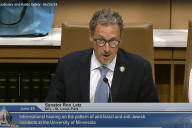You have /5 articles left.
Sign up for a free account or log in.
I'm currently attempting NOT to multi-task, given recent reports that increasing, device-facilitated (arguably, device-driven) high-frequency task-switching not only makes us less efficient at everything that we do, it's also gradually destroying our capacity to concentrate and even our ability to form long-term memories. After all, if you can't concentrate and you can't remember anything that happened more than 48 hours ago, how can you even hope to deal with complex, global, long-term problems?
If I were a conspiracy theorist, I'd be tempted to suggest that the recent (in geological terms) introduction of a dizzying array of informative and interruptive devices was fomented precisely to prevent us, as a society, from dealing with complex, global, long-term problems. As it is, I'm reminded of the title of an old book by management guru Warren Bennis -- "The Unconscious Conspiracy". Bennis writes about why leaders can't lead, but my cynical take on it is more along the lines of "why leaders don't want be seen to be leading directly". Kind of a Liddell Hart -esque take on civilian society. I suspect that confusion typically explains more than conspiracy, but I'm not sure that the confusion is entirely random.
(It reminds me of the old joke about the three golfers arguing about whose profession was the oldest. The doctor referred to Genesis and the removal of Adam's rib -- an obvious act of surgery. The engineer spoke of the earlier creation of the universe and the rendering of order out of chaos -- an act of engineering if ever there was one. And the third golfer (insert lawyer, politician, manager, etc. as audience dictates) asks "but where do you think the chaos came from?" <drum strike/cymbal clash> )
This whole subject of "is society even capable of paying attention?" has been bothering me for some time. (And no, I don't presume to somehow be immune to, or otherwise above, such a behavior pattern. I suspect that many of us have twinges of concern in this area, as triggered by our individual interests and occupations. Remember that "unconscious conspiracy" theme.) What did it, most recently, for me was last week's fiasco about how some 75% of the oil from the BP spill is just gone, followed by a clarification that no it's not, followed by the hand-off of administrative responsibility for paying damage claims from BP to Kenneth Feinberg. Followed by a discussion on NPR which pointed out that legally, waste created in oil exploration, development and production is not considered "hazardous" -- it's explicitly excluded by law and so legally disposable in any landfill with a typical clay liner. Regardless of, for example, its heavy metal content.
When I heard that, I was reminded of something I'd read a decade or more ago, about how the Indian government hadn't been able to decrease the pollution levels in the Ganges River to anything appropriate to safe bathing, much less drinking. And they didn't see any likelihood, given physical and social realities, that they ever would. So they declared that, as a holy river, it was inherently clean regardless of chemical or biological test results. (If that story is bogus, my apologies to Hindus everywhere, as well as to the country of India, its government, and its people. My concern with the story is more as analogy than as objectively true fact.)
If you'll go along with the analogy, then, what does it say about our civic religion if we've decided that wastes from oil production are, by definition, not hazardous? What does it say that we only focus on the superficial (oil on the surface or on the beaches) and attempt to declare anything not immediately visible as "gone"? And what does it say that we expect each other -- apparently, all of us -- not to notice?
On an unrelated, but parallel, track -- what does it say when a much-acclaimed "financial reform and consumer protection" bill exempts car dealers and the financial transactions they initiate? Aren't we all aware of "back-end" profits? Is there anyone who, when (s)he thinks of financial responsibility, immediately envisions an auto dealership? (Even one that sells only new cars?)





